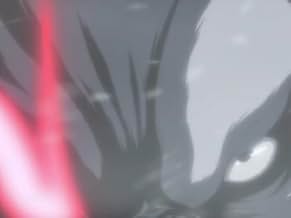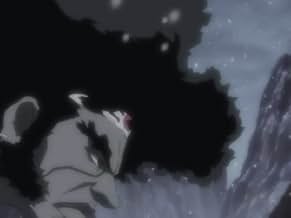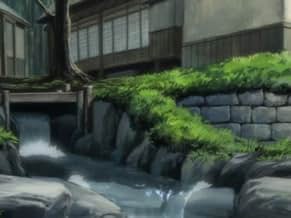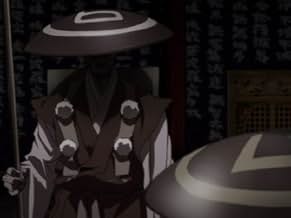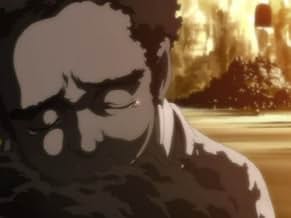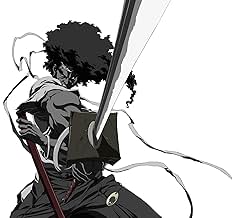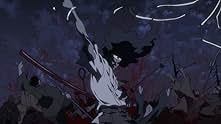Un samouraï noir part en mission pour venger la mort injustifiée de son père dans un Japon féodal futuriste.Un samouraï noir part en mission pour venger la mort injustifiée de son père dans un Japon féodal futuriste.Un samouraï noir part en mission pour venger la mort injustifiée de son père dans un Japon féodal futuriste.
Parcourir les épisodes
Avis à la une
10dee.reid
Can you dig it?
This is what you get when you mix Japanese samurai flicks, ultra-savvy blaxploitation attitude, future-tense technology, and hip-hop into one energetic camp hybrid that takes NO prisoners.
The pseudo-Anime' "Afro Samurai" is set in a futuristic feudal Japan, in which all the swordsmen in the world are in a murderous pursuit of the #1 Headband, which once obtained, would allow its wearer to call himself a god and master of all that he surveys. So when #1 is killed in a battle with gun-totting madman and #2 Headband Justice (Ron Perlman), #1's son Afro (Samuel L. Jackson) swears an oath of vengeance against now-#1 Justice. Undergoing conventional samurai training by a renowned master, young Afro grows up, receives the #2 Headband, sets out on his mission of revenge and attempts to obtain the #1 Headband, cutting down every single man who challenges him. Bearing witness to it all is Afro's loyal sidekick and only friend, Ninja Ninja (also voiced by Jackson), who provides much of the show's comic relief.
In many ways, at least to me, "Afro Samurai" was a long time coming. Ever since first getting wind of it in late 2006 and catching a few episodes during its short, five-episode run on Spike TV earlier this year, I've become an "Afro Samurai" fanatic. As a longtime fan of Japanese animation and Manga (Japanese comics), "Afro Samurai" cut and slashed its way into my heart from its earliest moments when Afro's father is challenged and defeated by the maniacal Justice. I've waited a long time for something to come along that fused hip-hop and Japanese animation into a relentless action feast and when it finally came along, I was not the slightest bit displeased. The animated show "The Boondocks" is another example of this Anime'/hip-hop trend done right.
But first and foremost, "Afro Samurai" is only concerned with one thing: style over substance, that means excessive sword-play and violence over anything even remotely resembling a discernible plot. Make no mistake, though, while this is a visually arresting feast for the eyes, it is definitely not for the squeamish, much less anyone under the tender age of 17. The brain-child of creator Takashi Okazaki, director Fuminori Kizaki and co-writers Tomohiro Yamashita and Yasuyuki Muto, "Afro Samurai" lets the blood flow (but really, more like spray) in fountains and geysers. The blood flows in copious amounts in the various martial arts sword-fighting sequences, which are excellently and stylishly executed much like Quentin Tarantino's "Kill Bill" movies or your favorite samurai blood-letters. The dynamic and surreal score by Wu-Tang Clan co-founder and "Afro Samurai" soundtrack producer The RZA is quite a stand-out, and blares up during the most intense action. Any soundtrack that features hip-hop legends such as Big Daddy Kane, Wu-Tang Clan co-founder GZA, Q-Tip (formerly of A Tribe Called Quest), and Talib Kweli - you can bet I'm picking it up.
So as you can see, I've said nothing but good things thus far. Many have maligned the fact that since Afro speaks so little in this series, his character comes to be defined by the way he viciously cuts down his adversaries in the many battle sequences. Probably like your favorite swordsman who speaks little but carries a big sword, Afro is really nothing new. In fact, if you look deeper, his comic foil Ninja Ninja could also be considered Afro's wild, fun-loving, and talkative alter-ego (since there were a few times when I felt Ninja Ninja wasn't even real).
"Afro Samurai" also has one of the most memorable casts of bad guys ever assembled for animation outside of Japan. I already mentioned Justice, but there's also the monk/assassin collective, the Empty 7, the teddy bear-headed Kuma, and assorted heavy artillery-totting hired killers and disposable bandits and hoodlums. Although I was a little disappointed that babe Kelly Hu as Okiku didn't have a bigger role, she only seemed to be in it for the sex appeal (and as the director's cut proves, to give a little something for the guys who may be watching). Although an odd choice for a role such as this, Samuel L. Jackson is a thorough double-edged sword as both Afro and Ninja Ninja. (It's hard to believe this is the same man who once played the Bible-quoting hit-man Jules Winnfield in 1994's "Pulp Fiction.")
With "Afro Samurai," an Anime' fan gets something that he's always wanted and more: a piece of animation that blends so many distant genres and fuses them into one hell of an eye-popping action experience. Now, if only he can convince his other Anime'- and "Kenshin"-loving friends to watch the one and only dude wit' a head full of hair, "Afro Samurai."
10/10
This is what you get when you mix Japanese samurai flicks, ultra-savvy blaxploitation attitude, future-tense technology, and hip-hop into one energetic camp hybrid that takes NO prisoners.
The pseudo-Anime' "Afro Samurai" is set in a futuristic feudal Japan, in which all the swordsmen in the world are in a murderous pursuit of the #1 Headband, which once obtained, would allow its wearer to call himself a god and master of all that he surveys. So when #1 is killed in a battle with gun-totting madman and #2 Headband Justice (Ron Perlman), #1's son Afro (Samuel L. Jackson) swears an oath of vengeance against now-#1 Justice. Undergoing conventional samurai training by a renowned master, young Afro grows up, receives the #2 Headband, sets out on his mission of revenge and attempts to obtain the #1 Headband, cutting down every single man who challenges him. Bearing witness to it all is Afro's loyal sidekick and only friend, Ninja Ninja (also voiced by Jackson), who provides much of the show's comic relief.
In many ways, at least to me, "Afro Samurai" was a long time coming. Ever since first getting wind of it in late 2006 and catching a few episodes during its short, five-episode run on Spike TV earlier this year, I've become an "Afro Samurai" fanatic. As a longtime fan of Japanese animation and Manga (Japanese comics), "Afro Samurai" cut and slashed its way into my heart from its earliest moments when Afro's father is challenged and defeated by the maniacal Justice. I've waited a long time for something to come along that fused hip-hop and Japanese animation into a relentless action feast and when it finally came along, I was not the slightest bit displeased. The animated show "The Boondocks" is another example of this Anime'/hip-hop trend done right.
But first and foremost, "Afro Samurai" is only concerned with one thing: style over substance, that means excessive sword-play and violence over anything even remotely resembling a discernible plot. Make no mistake, though, while this is a visually arresting feast for the eyes, it is definitely not for the squeamish, much less anyone under the tender age of 17. The brain-child of creator Takashi Okazaki, director Fuminori Kizaki and co-writers Tomohiro Yamashita and Yasuyuki Muto, "Afro Samurai" lets the blood flow (but really, more like spray) in fountains and geysers. The blood flows in copious amounts in the various martial arts sword-fighting sequences, which are excellently and stylishly executed much like Quentin Tarantino's "Kill Bill" movies or your favorite samurai blood-letters. The dynamic and surreal score by Wu-Tang Clan co-founder and "Afro Samurai" soundtrack producer The RZA is quite a stand-out, and blares up during the most intense action. Any soundtrack that features hip-hop legends such as Big Daddy Kane, Wu-Tang Clan co-founder GZA, Q-Tip (formerly of A Tribe Called Quest), and Talib Kweli - you can bet I'm picking it up.
So as you can see, I've said nothing but good things thus far. Many have maligned the fact that since Afro speaks so little in this series, his character comes to be defined by the way he viciously cuts down his adversaries in the many battle sequences. Probably like your favorite swordsman who speaks little but carries a big sword, Afro is really nothing new. In fact, if you look deeper, his comic foil Ninja Ninja could also be considered Afro's wild, fun-loving, and talkative alter-ego (since there were a few times when I felt Ninja Ninja wasn't even real).
"Afro Samurai" also has one of the most memorable casts of bad guys ever assembled for animation outside of Japan. I already mentioned Justice, but there's also the monk/assassin collective, the Empty 7, the teddy bear-headed Kuma, and assorted heavy artillery-totting hired killers and disposable bandits and hoodlums. Although I was a little disappointed that babe Kelly Hu as Okiku didn't have a bigger role, she only seemed to be in it for the sex appeal (and as the director's cut proves, to give a little something for the guys who may be watching). Although an odd choice for a role such as this, Samuel L. Jackson is a thorough double-edged sword as both Afro and Ninja Ninja. (It's hard to believe this is the same man who once played the Bible-quoting hit-man Jules Winnfield in 1994's "Pulp Fiction.")
With "Afro Samurai," an Anime' fan gets something that he's always wanted and more: a piece of animation that blends so many distant genres and fuses them into one hell of an eye-popping action experience. Now, if only he can convince his other Anime'- and "Kenshin"-loving friends to watch the one and only dude wit' a head full of hair, "Afro Samurai."
10/10
Afro Samurai started as life as manga before animation studio GONZO adapted the story into a five episode series that premiered online January 1 2007.
Like most contemporary anime, Afro Samurai is another exercise in culture jamming, straddling genres as diverse as Blaxploitation, kung-fu cinema, splatter flicks, western and, of course, Japanese animation. Samuel L. Jackson lends his talents in the voice department, and is also credited as one of the shows producers.
The plot revolves around Afro - nicknamed after his hairstyle - a perpetually silent and bloodthirsty master swordsman, whose quest involves exacting bloody revenge on the man who killed his father, and claiming the title of 'Number One'; a warrior whose powers are comparable to those of a god. Given only five episodes to work with, structure is pretty tight here, so there are no filler episodes or meandering off-sides or tangents to distract from the narrative's focus. Although the series seems to lack that 'epic' journey feel, episodes are never anti-climactic; this is a relief to the casual anime viewer who just wants to get to the carnage.
And carnage there is a-plenty. The plot of Afro Samurai is really just an after thought; it's the fight scenes that are really the star of the show here. A word to the squeamish: Afro Samurai is one of the bloodiest, goriest and most anatomically detailed anime series on the market, so if you've got stomach issues with splatter flicks, avoid this one like syphilis. If, however, high-definition animated gore-porn is your thing, Afro Samurai will not disappoint. Each fight scene is beautifully choreographed and fluidly animated to deliver some truly jaw-dropping, gut-wrenching, wince "oh man, that's gotta hurt"-inducing scenes of unadulterated devastation on the human body. Be-heading, disemboweling and eye-stabbing are just an entrée.
The only thing wrong with Afro Samurai is that it's all over too soon. Most anime fans are used to more meat on the bones, so for many the narrative will feel underdone and the characters under-developed. This is probably a side-effect of the show's creators attempting to cross anime over to a mainstream Western audience, but, in doing so, seem to have sacrificed content for carnage. And while carnage seems to be the whole point of Afro Samurai, five episodes is still remarkably short. Although the series swiftly resolves itself in a fairly predictable way, there is an immense potential for spin-off projects (there's a movie rumor already doing the rounds in cyberspace) and the show itself is re-watchable many times over, if only to sample the audacious ultra-violence again and again. For those of you with an unquenchable blood-lust, Afro Samurai will have you screaming with delight.
Like most contemporary anime, Afro Samurai is another exercise in culture jamming, straddling genres as diverse as Blaxploitation, kung-fu cinema, splatter flicks, western and, of course, Japanese animation. Samuel L. Jackson lends his talents in the voice department, and is also credited as one of the shows producers.
The plot revolves around Afro - nicknamed after his hairstyle - a perpetually silent and bloodthirsty master swordsman, whose quest involves exacting bloody revenge on the man who killed his father, and claiming the title of 'Number One'; a warrior whose powers are comparable to those of a god. Given only five episodes to work with, structure is pretty tight here, so there are no filler episodes or meandering off-sides or tangents to distract from the narrative's focus. Although the series seems to lack that 'epic' journey feel, episodes are never anti-climactic; this is a relief to the casual anime viewer who just wants to get to the carnage.
And carnage there is a-plenty. The plot of Afro Samurai is really just an after thought; it's the fight scenes that are really the star of the show here. A word to the squeamish: Afro Samurai is one of the bloodiest, goriest and most anatomically detailed anime series on the market, so if you've got stomach issues with splatter flicks, avoid this one like syphilis. If, however, high-definition animated gore-porn is your thing, Afro Samurai will not disappoint. Each fight scene is beautifully choreographed and fluidly animated to deliver some truly jaw-dropping, gut-wrenching, wince "oh man, that's gotta hurt"-inducing scenes of unadulterated devastation on the human body. Be-heading, disemboweling and eye-stabbing are just an entrée.
The only thing wrong with Afro Samurai is that it's all over too soon. Most anime fans are used to more meat on the bones, so for many the narrative will feel underdone and the characters under-developed. This is probably a side-effect of the show's creators attempting to cross anime over to a mainstream Western audience, but, in doing so, seem to have sacrificed content for carnage. And while carnage seems to be the whole point of Afro Samurai, five episodes is still remarkably short. Although the series swiftly resolves itself in a fairly predictable way, there is an immense potential for spin-off projects (there's a movie rumor already doing the rounds in cyberspace) and the show itself is re-watchable many times over, if only to sample the audacious ultra-violence again and again. For those of you with an unquenchable blood-lust, Afro Samurai will have you screaming with delight.
alright, so i've real a lot of negative reviews of this show on here. Well kids, i'm going to defend this show, because there's a lot too it you guys are missing out on.
Afro Samurai is the new anime produced by and starring Mr. Samuel L. Jackson, as well as high end voice talent like Phil LaMarr of Samurai Jack fame, and Ron Perlman, the man who is and will always be Hellboy.
Like the great works of Shinichiro Watanabe, this work employs heavily the influence of western culture, specifically black western culture, which i suppose makes sense considering our stoic protagonist. now when i say black western culture, i'm not just talking about hip-hop music, i'm talking about Blaxploitation as well.
for those of you who don't know, Blaxploitation was a sub-genre of the 70's Exploitation films that dominated the drive-in scene during that period of American cinema history. the most famous and accessible Blaxploitation films these days are probably the Dolemite series of films, the Shaft series, or the classic Sweet Sweetback's Badass Song. these films were, for the most part terrible, but they influenced a generation of post-civil rights urban youth struggling to find an identity into action. they were stylish, fun, and gave an overall message of standing up for yourself and being proud of who you are, despite their inherent sexism, these films were the Noir flicks of their day, gritty and edgy and bleeding style. theaters in the 70's that would carry Exploitation and Blaxploitation films also carried many Kung Fu and Samurai films, so when 70's funk culture evolved into hip hop culture, it wasn't so shocking that the children who idolized Sweet Sweetback, also pulled influence from Yojimbo and Zoatichi, in fact, one of those children of influence even did the score for Afro Samurai - The RZA of The Wu Tang Clan, a seminal rap group that not only incorporated samurai and kung fu films into their lyrics, but into the music itself as well.
Okay, History lesson over, the reason i wanted to make you read all that is so that you have a better idea of where Afro Samurai is coming from, it is, for all intents and purposes, the coming together of cultures that are not, and have never been so far apart as you may think. a lot of people are also calling Afro-Samurai a child of the spaghetti western genre, which i suppose is true, but it must also be understood that the spaghetti western was heavily influenced by samurai films before them. Sergio Leone probably wouldn't even have a career if it wasn't for Akira Kurosowa's films.
Now, onto the show itself. Afro Samurai is incredibly simple, but i say that in the most endearing way possible. being convoluted is not a prerequisite of having substance or being artistic. Samurai Jack, a long running and long praised show has proved this time and again. great stories like the Hellboy series of comics or the popular Battlestar Galactica show, are great because they manage to turn schlocky cheese into high art, by giving it a modern overhaul. Afro Samurai takes it one step further, to the point where the schlock IS the art. Anime is very much like our version of the Exploitation genre of yesteryear, it's very underground, but still holds popularity and knowledge in the mainstream, it's filled with shitty crap, but the good stuff is worth watching, and it has it's own very unique style that has influenced generations of artists who've been exposed to it.
the story of Afro Samurai is very very basic, it's a revenge story because it needn't be anything more than a revenge story. it's intent isn't to change your life or make you weep for it's tragic hero, it's intent is to make your eyes melt and your heart pump, and maybe throw in a laugh or two. there's a saying: You Don't watch Kill Bill the same way you watch Shindler's List. that applies.
shows like Afro Samurai and the vampire miniseries Hellsing are fantastic shows because they take from the well of culture not everybody likes to admit is there, and shows you something that takes it one step further, shows you what those film makers of yesteryear could have done with the technology at our disposal today. they work on a storytelling level because the stories are simple and have been told many times. they are human stories.
the idea of Afro Samurai, i can say with some confidence, was never to get you thinking about our society like Ghost in the Shell or Neon Genesis, it's not that horse. Afro Samurai is meant to appeal to something deeper than your ego or your intellect, it appeals to your instinct. that's why it's so stylish. it's pleasure is purely aesthetic, and that is not at all a bad thing. Anime has a long history of taking from western culture and vice-versa, i like to think of Afro Samurai less as a corny bloodbath, and more a celebration of the corny bloodbaths we all know and love. western stories like Fist Full o' Dollars, The Good The Bad and The Ugly, and eastern stories like Ninja Scroll and Yojimbo. the standard for art these days is too narrow and too pretentious considering our history. i love Afro Samurai because it's not trying to deny all the things we hate to love, blood, gore, revenge, and i'm not saying that to be nihilistic or cynical. i'm saying that because it's true, it's just easier to justify revenge and blood and gore when we can come up with some over-convoluted plot to fit it into. well screw that.
Enjoy.
Afro Samurai is the new anime produced by and starring Mr. Samuel L. Jackson, as well as high end voice talent like Phil LaMarr of Samurai Jack fame, and Ron Perlman, the man who is and will always be Hellboy.
Like the great works of Shinichiro Watanabe, this work employs heavily the influence of western culture, specifically black western culture, which i suppose makes sense considering our stoic protagonist. now when i say black western culture, i'm not just talking about hip-hop music, i'm talking about Blaxploitation as well.
for those of you who don't know, Blaxploitation was a sub-genre of the 70's Exploitation films that dominated the drive-in scene during that period of American cinema history. the most famous and accessible Blaxploitation films these days are probably the Dolemite series of films, the Shaft series, or the classic Sweet Sweetback's Badass Song. these films were, for the most part terrible, but they influenced a generation of post-civil rights urban youth struggling to find an identity into action. they were stylish, fun, and gave an overall message of standing up for yourself and being proud of who you are, despite their inherent sexism, these films were the Noir flicks of their day, gritty and edgy and bleeding style. theaters in the 70's that would carry Exploitation and Blaxploitation films also carried many Kung Fu and Samurai films, so when 70's funk culture evolved into hip hop culture, it wasn't so shocking that the children who idolized Sweet Sweetback, also pulled influence from Yojimbo and Zoatichi, in fact, one of those children of influence even did the score for Afro Samurai - The RZA of The Wu Tang Clan, a seminal rap group that not only incorporated samurai and kung fu films into their lyrics, but into the music itself as well.
Okay, History lesson over, the reason i wanted to make you read all that is so that you have a better idea of where Afro Samurai is coming from, it is, for all intents and purposes, the coming together of cultures that are not, and have never been so far apart as you may think. a lot of people are also calling Afro-Samurai a child of the spaghetti western genre, which i suppose is true, but it must also be understood that the spaghetti western was heavily influenced by samurai films before them. Sergio Leone probably wouldn't even have a career if it wasn't for Akira Kurosowa's films.
Now, onto the show itself. Afro Samurai is incredibly simple, but i say that in the most endearing way possible. being convoluted is not a prerequisite of having substance or being artistic. Samurai Jack, a long running and long praised show has proved this time and again. great stories like the Hellboy series of comics or the popular Battlestar Galactica show, are great because they manage to turn schlocky cheese into high art, by giving it a modern overhaul. Afro Samurai takes it one step further, to the point where the schlock IS the art. Anime is very much like our version of the Exploitation genre of yesteryear, it's very underground, but still holds popularity and knowledge in the mainstream, it's filled with shitty crap, but the good stuff is worth watching, and it has it's own very unique style that has influenced generations of artists who've been exposed to it.
the story of Afro Samurai is very very basic, it's a revenge story because it needn't be anything more than a revenge story. it's intent isn't to change your life or make you weep for it's tragic hero, it's intent is to make your eyes melt and your heart pump, and maybe throw in a laugh or two. there's a saying: You Don't watch Kill Bill the same way you watch Shindler's List. that applies.
shows like Afro Samurai and the vampire miniseries Hellsing are fantastic shows because they take from the well of culture not everybody likes to admit is there, and shows you something that takes it one step further, shows you what those film makers of yesteryear could have done with the technology at our disposal today. they work on a storytelling level because the stories are simple and have been told many times. they are human stories.
the idea of Afro Samurai, i can say with some confidence, was never to get you thinking about our society like Ghost in the Shell or Neon Genesis, it's not that horse. Afro Samurai is meant to appeal to something deeper than your ego or your intellect, it appeals to your instinct. that's why it's so stylish. it's pleasure is purely aesthetic, and that is not at all a bad thing. Anime has a long history of taking from western culture and vice-versa, i like to think of Afro Samurai less as a corny bloodbath, and more a celebration of the corny bloodbaths we all know and love. western stories like Fist Full o' Dollars, The Good The Bad and The Ugly, and eastern stories like Ninja Scroll and Yojimbo. the standard for art these days is too narrow and too pretentious considering our history. i love Afro Samurai because it's not trying to deny all the things we hate to love, blood, gore, revenge, and i'm not saying that to be nihilistic or cynical. i'm saying that because it's true, it's just easier to justify revenge and blood and gore when we can come up with some over-convoluted plot to fit it into. well screw that.
Enjoy.
Afro Samurai came out of left field from me. Totally unexpected, I saw the tile pop up somewhere and sounded cool enough for me to give it a go. And even though I'm not an anime fan, I found lots to appreciate in this mini series of blood and mayhem.
The main appeal for me was the combination of blaxploitation culture and samurai swordfighting (chambara). Samuel Jackson doing the voice-overs for both Afro Samurai (Clint Eastwood style, few words, calm and badass) and his sidekick Ninja Ninja (wisecracking non-stop banter) was another major plus. The third advantage is the simple story that takes its cue from a long line of revenge movies: this is a simple revenge story and that's why it works so well.
In a futuristic world, young kid watches his father get cut down by baddie who is after his father's Headband #1. Headband #1 allows its bearer to be like a god. The only one who can challenge him is the one who wears Headband #2. Anyone can challenge Headband #2. As one could expect, Headband #2's path is littered with corpses as everyone and their dog want their chance to challenge Headband #1. Young kid grows up and becomes Afro Samurai and walks the path of revenge against Headband #1. A colourful ensemble of baddies will stand in his way, from a neo-Buddhist cult of assassin monks, to cyborgs to teddy-bear faced guys with a grudge to common crooks. Through flashbacks we come to find out how Afro Samurai became who he is and how he obtained Headband #2. Simple yet effective.
The main appeal here is the visual aspect. Being a fan of 60's and 70's chambaras and jidai-gekis I find the swordfights a tad too hyperkinetic for my taste, but that's anime for you I guess. However everything has a smoother, more westernized approach perhaps to the rapid, eyesore that often is the genre which I took to with pleasant surprise and relief. The graphics and design tend to be great (especially Afro Samurai's) although they can settle for just good or serviceable at times. The blood geysers and slashing, taking their cue from stuff like Lone Wolf and Cub and Lady Snowblood (copious amounts of glorious arterial sprayings) will please every fan of the red stuff although it's not particularly gruesome. Good, clean, family fun.
The soundtrack is done by usual suspect RZA. I have to say that the whole combo of hip-hop/anime/exploitation works particularly well even though I'm only a fan of the latter third. If you wanna get a picture of what Afro Samurai is, think of the animated sequence in Kill Bill vol. 1.
The main appeal for me was the combination of blaxploitation culture and samurai swordfighting (chambara). Samuel Jackson doing the voice-overs for both Afro Samurai (Clint Eastwood style, few words, calm and badass) and his sidekick Ninja Ninja (wisecracking non-stop banter) was another major plus. The third advantage is the simple story that takes its cue from a long line of revenge movies: this is a simple revenge story and that's why it works so well.
In a futuristic world, young kid watches his father get cut down by baddie who is after his father's Headband #1. Headband #1 allows its bearer to be like a god. The only one who can challenge him is the one who wears Headband #2. Anyone can challenge Headband #2. As one could expect, Headband #2's path is littered with corpses as everyone and their dog want their chance to challenge Headband #1. Young kid grows up and becomes Afro Samurai and walks the path of revenge against Headband #1. A colourful ensemble of baddies will stand in his way, from a neo-Buddhist cult of assassin monks, to cyborgs to teddy-bear faced guys with a grudge to common crooks. Through flashbacks we come to find out how Afro Samurai became who he is and how he obtained Headband #2. Simple yet effective.
The main appeal here is the visual aspect. Being a fan of 60's and 70's chambaras and jidai-gekis I find the swordfights a tad too hyperkinetic for my taste, but that's anime for you I guess. However everything has a smoother, more westernized approach perhaps to the rapid, eyesore that often is the genre which I took to with pleasant surprise and relief. The graphics and design tend to be great (especially Afro Samurai's) although they can settle for just good or serviceable at times. The blood geysers and slashing, taking their cue from stuff like Lone Wolf and Cub and Lady Snowblood (copious amounts of glorious arterial sprayings) will please every fan of the red stuff although it's not particularly gruesome. Good, clean, family fun.
The soundtrack is done by usual suspect RZA. I have to say that the whole combo of hip-hop/anime/exploitation works particularly well even though I'm only a fan of the latter third. If you wanna get a picture of what Afro Samurai is, think of the animated sequence in Kill Bill vol. 1.
Hip-hop in feudal japan? Guy on a quest to become "number one"? My first impressions of this anime, based on promotional material back in 2007, were not too good. I'm not a big fan of hip-hop for one thing, and neither do I dig the overused plot device of a lone warrior traveling the country to seek vengeance, which was handled so much better by Yoshiaki Kawajiri in Ninja Scroll or Highlander. Dismissed it immediately.
It is 2009 now and I discovered Afro Samurai: Director's Cut in the discount bin at the DVD store. Bought it, watched it, and GOT HOOKED by it.
The first thing that struck me was the whole "attitude" of the show. Science fiction, fantasy, samurai films, blaxploitation, all blended together into one tasty soup. If shows like Ghost in the Shell appeals to the higher reasoning and logical portions of the brain and Grave of the Fireflies appeal to the emotional centers, Afro Samurai would be a show that appeals to the most basic drives of human cognition.
It is pure "Id" given form, striving to do no more than to satisfy the instinctual needs for pleasure. In the same way the ancient Romans loved their gladiatorial combat and their lions vs prisoners shows, this anime digs deep into the dark recesses of the human mind which hides that aggressive streak and answers its denied cravings by delivers non-stop violence with a whole new attitude. The highly stylized art works well for such a show, containing an exceptionally high level of detail more common in feature film animation than in a direct-to-DVD miniseries. The animation is fluid, smooth and conveys a sense of "free flow", like watching a professional break-dancer; everything is constantly in flux. Like the "Id", the action is excessive and illogically over-the-top: A testament to the limitless potential of animation and the illogical and almost random nature of our basic human instincts.
Even the slightly disjointed and simplistic story reflects the properties of the "Id". In keeping with the "style over substance" the creative team did not even try to make an original narrative. The story presented here is an extremely simple one, stocked to the brim with clichés. As a kid, young Afro watched his dad die at the hands of an evil gunman(played by Ron "Hellboy" Perlman), and vowed to spend the rest of his life training in the samurai way to take down his father's killer and become "Number One." Along the way, he meets old friends, new enemies and host of quirky characters in a stylish world where ancient feudal japan meets post-modern science fiction and fantasy.
Clichés also extend to the many characters in this show. Stoic silent wanderer with comic relief sidekick (sounds like Vampire Hunter D and his left hand), femme fatale who falls for our hero, mysterious mafia-like villains, etc. What lends new life to these tired old clichés is the fresh new attitude and style that Afro Samurai brings with it. It is like an all new liquor cocktail which uses existing ingredients, but what sets it apart from other cocktails is how everything is mixed together.
Special mention goes to Samuel L Jackson who plays both the stoic Afro and his loud mouthed trash talking sidekick, Ninja-ninja. His acting, as with every other member of the cast is spot on, and I love how he can play the two characters so differently with the same level of professionalism. Honestly if I never looked at the cast list, I would have never thought he voiced those two characters at the same time.
Afro Samurai is to this new century what Ninja Scroll was to the 90s: A bloody, violent, fresh, unabashed display of excessiveness that delivers what it promises. A highly original concept recommended for fans who are bored with your typical shonen anime and looking for something new, refreshing and just oozing with ATTITUDE.
It is 2009 now and I discovered Afro Samurai: Director's Cut in the discount bin at the DVD store. Bought it, watched it, and GOT HOOKED by it.
The first thing that struck me was the whole "attitude" of the show. Science fiction, fantasy, samurai films, blaxploitation, all blended together into one tasty soup. If shows like Ghost in the Shell appeals to the higher reasoning and logical portions of the brain and Grave of the Fireflies appeal to the emotional centers, Afro Samurai would be a show that appeals to the most basic drives of human cognition.
It is pure "Id" given form, striving to do no more than to satisfy the instinctual needs for pleasure. In the same way the ancient Romans loved their gladiatorial combat and their lions vs prisoners shows, this anime digs deep into the dark recesses of the human mind which hides that aggressive streak and answers its denied cravings by delivers non-stop violence with a whole new attitude. The highly stylized art works well for such a show, containing an exceptionally high level of detail more common in feature film animation than in a direct-to-DVD miniseries. The animation is fluid, smooth and conveys a sense of "free flow", like watching a professional break-dancer; everything is constantly in flux. Like the "Id", the action is excessive and illogically over-the-top: A testament to the limitless potential of animation and the illogical and almost random nature of our basic human instincts.
Even the slightly disjointed and simplistic story reflects the properties of the "Id". In keeping with the "style over substance" the creative team did not even try to make an original narrative. The story presented here is an extremely simple one, stocked to the brim with clichés. As a kid, young Afro watched his dad die at the hands of an evil gunman(played by Ron "Hellboy" Perlman), and vowed to spend the rest of his life training in the samurai way to take down his father's killer and become "Number One." Along the way, he meets old friends, new enemies and host of quirky characters in a stylish world where ancient feudal japan meets post-modern science fiction and fantasy.
Clichés also extend to the many characters in this show. Stoic silent wanderer with comic relief sidekick (sounds like Vampire Hunter D and his left hand), femme fatale who falls for our hero, mysterious mafia-like villains, etc. What lends new life to these tired old clichés is the fresh new attitude and style that Afro Samurai brings with it. It is like an all new liquor cocktail which uses existing ingredients, but what sets it apart from other cocktails is how everything is mixed together.
Special mention goes to Samuel L Jackson who plays both the stoic Afro and his loud mouthed trash talking sidekick, Ninja-ninja. His acting, as with every other member of the cast is spot on, and I love how he can play the two characters so differently with the same level of professionalism. Honestly if I never looked at the cast list, I would have never thought he voiced those two characters at the same time.
Afro Samurai is to this new century what Ninja Scroll was to the 90s: A bloody, violent, fresh, unabashed display of excessiveness that delivers what it promises. A highly original concept recommended for fans who are bored with your typical shonen anime and looking for something new, refreshing and just oozing with ATTITUDE.
Le saviez-vous
- AnecdotesSamuel L. Jackson and Phil LaMarr appeared in Pulp Fiction (1994).
- Citations
Afro Samurai: Nothing personal. It's just revenge.
- Versions alternativesThe DVD is available in two versions: a Spike TV edited version and a Uncut/uncensored version with more sex and violence.
- ConnexionsFeatured in Anime: Drawing a Revolution (2007)
- Bandes originalesHate
Written by Michael Baiardi and Christian Altman and Matthew Harris
Published by Soundfile Publishing (ASCAP)
Performed by M1
Courtesy of Soundfile Records
Meilleurs choix
Connectez-vous pour évaluer et suivre la liste de favoris afin de recevoir des recommandations personnalisées
Détails
Contribuer à cette page
Suggérer une modification ou ajouter du contenu manquant

Lacune principale
What is the Brazilian Portuguese language plot outline for Afro Samurai (2007)?
Répondre






